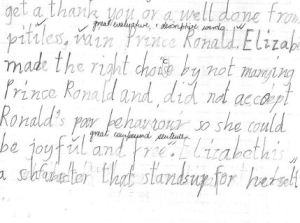Since October last year, when I was declared five years cancer free with nil evidence of disease and discharged by my oncologist, things have been going along swimmingly. There’s been no literal swimming, as that would first require a bodily deforestation akin to the complete obliteration of the Amazonian rain forest, but there’s been lots of gently breast-stroking (singular) through life’s currently churn-free waters. My new job is proving equal parts challenging and rewarding, Dave is one week away from heading to Nepal to climb to Everest Base Camp, and Hugh is busy being almost 10 years old, loving computer games, playing piano like Liberace on crack, and teaching himself to draw cartoons.
My new office with the Charles Blackman on the wall feels a bit more lived in now I’ve been in it for a few weeks. Most days I go home with a brain that’s either fried from dealing with multiple competing priorities, or buzzing with possibilities for new projects and concepts. I’ve had some wins and made some mistakes, but given that nobody dies if I bugger something up, it’s all chalked up to experience. Given I didn’t work a single day for eight months through multiple surgeries, chemo and radiation, and then worked part-time for almost a year, I feel incredibly fortunate – and also very proud – to be sitting where I am, doing what I do.
The Everest Base Camp trek has been planned since Dave turned 50 last year – in fact it was my birthday present to him. He is going with a mate, and has steadily worked on his fitness over the past 9 months, to the point where he is trim, fit and ready to go. It is a massive physical and mental challenge, but knowing Dave as I do, I have no concerns about his ability to complete the trek. Of course altitude sickness is the big unknown that can bring Everest trekkers unstuck, and I will no doubt worry incessantly for the 16 days he is away, but I am so incredibly proud that he is going to give this his best shot.
Hugh is in year 5 and is still, for the most part, an utter joy. Most people comment on his smarts, politeness and his easy-going nature, whilst other people (specifically his mother) comment on his disorganisation, eye-rolling and distaste for vegetables. But he is a good kid with a cracking sense of humour, who is growing into the sort of person you’d genuinely like to hang out with, and that makes me incredibly happy.
He was four when I was diagnosed with breast cancer and will soon turn 10. He doesn’t talk about my illness, and to the naked eye would appear to be completely unscathed by it. Then, yesterday, his teacher sends home his English assessment – the first chapter of a fantasy novel. It’s really good – interesting, well-written and punctuated within an inch of its life (apple meet tree). I start reading it and my heart starts filling up, for I do love words and images and the power of story-telling. And then, bang, I’m hit and can’t catch my breath and suddenly need to lean against the kitchen bench as my eyes trace over and over these words:

Cancer is a bastard. It is insidious, inveigling, and continues to whisper its own name, over and over, into the ears of people with whom it has no business. I had forgotten that for a while, but have been roundly and soundly reminded.
It’s a long game.
A very fucking long game.

